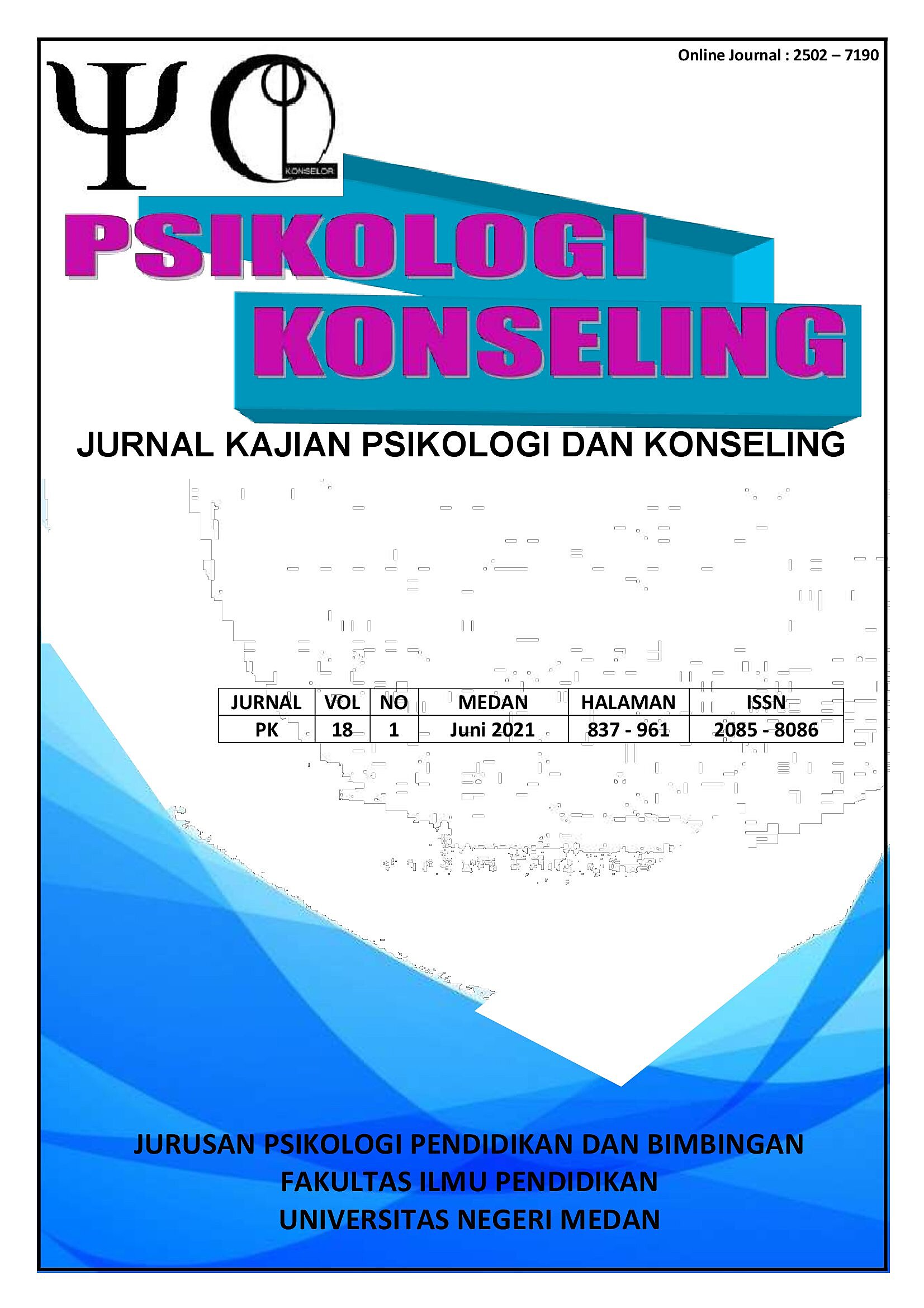IBU MILENIAL DAN SHARENTING LIFESTYLE DI IBU KOTA
DOI:
https://doi.org/10.24114/konseling.v18i1.27831Keywords:
Sharenting, Ibu Muda, Media SosialAbstract
Narrative review ini bertujuan untuk memperoleh informasi mengenai ibu mileneal dan sharenting lifestyle. Penulisan ini memiliki beberapa tema diantaranya Peran Ibu Muda Milenial Pada Komunitas Virtual, Pemanfaatan teknologi digital di kalangan Ibu muda milenial, Sharenting lifestyle di Ibu Kota, Aplikasi media sosial yang paling berpengaruh pada proses sharenting, Motif Ibu Pada perilaku Sharenting, Literasi digital sebagai upaya preventative, Persoalan Pengasuhan pada pertumbuhan anak. Kesimpulan dalam penulisan ini adalah Pada saat ini ibu membesarkan anak yang dalam budaya yang mengutamakan digital. Ibu muda juga memanfaatkan budaya baru ini untuk mendapatkan informasi mengenai pengasuhan. Pengetahuan Ibu muda di Ibu Kota terkait sharenting hanya mengetahui tanpa memahami bahaya dari membagikan informasi anak di media sosial Selain itu ibu memanfaatkan budaya sharenting ini untuk berbagi dalam informasi pengasuhan dan mendapatkan penegasan atau pengakuan yang dilakukan ibu dalam mengasuh anak. Ibu melakukan sharenting bukan tanpa alasan terdapat enam motif ibu melakukannya di antaranya 1) motif ingin tahu; 2) motif kompetensi; 3) motif cinta; 4) motif harga diri; 5) kebutuhan akan nilai; 6) kebutuhan pemenuhan diri. Hal ini menunjukkan bahwa perilaku sharenting yang dilakukan orang tua mempunyai motif bermacam-macam.References
Acquisti, A., Brandimarte, L., & Loewenstein, G. (2015). Privacy and human behavior in the age of information. Science, 347(6221), 509-514
APJII. (2019). Penetrasi & Profil Perilaku Pengguna Internet Indonesia Tahun 2018.Jakarta: Asosiasi penyelenggara Jasa Internet Indonesia.
Bartsch, M., & Dienlin, T. (2016). Control your Facebook: An analysis of online privacy literacy. Computers in Human Behavior, 56, 147-154
Blum-Ross, A., & Livingstone, S. (2017). œSharenting, parent blogging, and the boundaries of the digital self. Popular Communication, 15(2), 110“125. https://doi.org/10.1080/15405702.2016.1223300
Braun, V. dan Clarke, V. 2006. œUsing Thematic Analysis in Psychology. Qualitative Research in Psychology. Vol. 3 No. 2. pp. 77-10
Brosch, A. (2016). When the child is born into the internet: Sharenting as a growing trend among parents on Facebook. New Educational Review, 43(1), 225“235. https://doi.org/10.15804/tner.2016.43.1.19
Brosch, A. (2018). Sharenting “ Why do parents violate their children™s privacy? New Educational Review, 54(4): 75“85.
Christofides, E., Muise, A., & Desmarais, S. (2012). Hey mom, what™s on your Facebook? Comparing Facebook disclosure and privacy in adolescents and adults. Social Psychological and Personality Science, 3(1), 48-54
C.S. Mott Children™s Hospital. (2015). Parents on social media: Likes and dislikes of sharenting. National Poll on Children™s Health, 23(2).
Febrina, Annisa. (2019). Motif Orang tua Mengunggah Foto Anak di Instagram (Studi Fenomenologi Terhadap Orang tua di Jabodetabek). Jurnal Abdi Ilmu, 12(1): 55-65.
Fernández-Montalvo, J., Peñalva, A., Irazabal, I., & López-Goñi, J. J. (2017). Effectiveness of a digital literacy programme for primary education students/Efectividad de un programa de alfabetización digital para estudiantes de educación primaria. Cultura y Educación, 29(1), 1-30
Gilster, P. (1997). Digital literacy. New York, NY: Wiley.
Kumar, P., & Schoenebeck, S. (2015). The modern day baby book: Enacting Good mothering and stewarding privacy on Facebook. Proceedings of the 18th ACM Conference on Computer Supported Cooperative Work & Social Computing, pp.1302-1312, Vancouver, Canada
Martini, F.H., Nath, J.L., Bartholomew, E.F. 2012. Fundamentals of Anatomy & Physiology. San Fransisco: Pearson Education, Inc.
Morris, M. R. (2014). Social networking site use by mothers of young children. Proceedings of the 17th ACM Conference on Computer Supported Cooperative Work & Social Computing - CSCW ™14 (pp. 1272“1282)
Mowen John dan Michael Minor. 2002. Perilaku Konsumen. Jakarta : Erlangga.
Park, Y. J. (2013). Digital literacy and privacy behavior online. Communication Research, 40(2), 215-236
Petra, U. K., & Siwalankerto, J. (2015). Financial Stressors , Financial Behavior , Risk Tolerance , Financial Solvency , Financial Knowledge , dan Kepuasan Finansial, 3(1), 19“23.
Pribadi, A. S., Pratiwi, M. M. S., & Brotowidagdo, R. (2011). Motif Afiliasi Pengguna Aktif Facebook. Proyeksi Jurnal Psikologi, 6(2): 50“57.
RodrÃguez de Dios, I. (2018). Risks of interactive communication in adolescents. Digital literacy diagnosis and intervention (Doctoral dissertation, University of Salamanca).
Sideri, M., Kitsiou, A., Tzortzaki, E., Kalloniatis, C., & Gritzalis, S. (2017, December). œI Have Learned that I Must Think Twice Before¦. An Educational Intervention for Enhancing Students™ Privacy Awareness in Facebook. In International Conference on e-Democracy (pp. 79-94). Springer, Cham
Verswijvel, K & Ouvrein, G. (2019). Sharenting: Parental adoration or public humiliation? A focus group study on adolescents™ experiences with sharenting against the background of their own impression management. Children and Youth Services Review, 99: 319“327.
Wellman, B., Quan-Haase A., Boase J. and Chen W. 2003. The Social Affordances of the Internet for Networked Individualism. Journal of Computer-Mediated Communication 8(3)
Zhang-Kennedy, L., Abdelaziz, Y., & Chiasson, S. (2017). Cyberheroes: The design and evaluation of an interactive ebook to educate children about online privacy. International Journal of Child-Computer Interaction, 13, 10-18.
Downloads
Published
How to Cite
Issue
Section
License
Copyright (c) 2021 Rizqi Fauziah, Allika Nur Ramdina Syahas, Mayang Salsabila Lubis, Mirdat Silitonga

This work is licensed under a Creative Commons Attribution-ShareAlike 4.0 International License.
This work is licensed under a Creative Commons Attribution-ShareAlike 4.0 International License.




